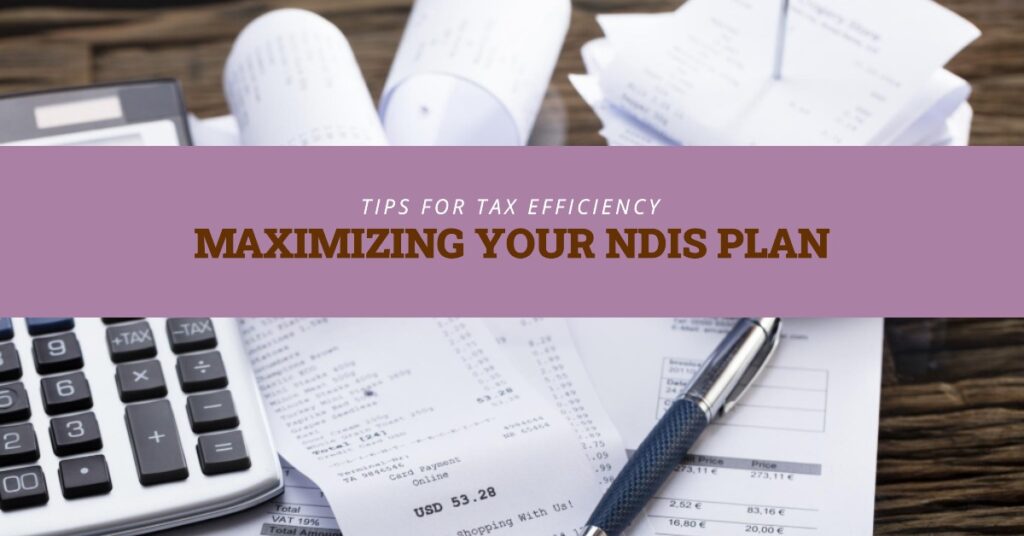Maximizing tax efficiency for NDIS plan management involves selecting a qualified plan management provider with proven NDIS experience and cost-effective services. Implement digital record-keeping systems to maintain accurate documentation and facilitate easy retrieval for deductions. Understand and utilize GST exemptions to significantly reduce costs and claim appropriate GST credits, which can lessen the financial burden. Ensure that all expenses are tracked meticulously and acquitted through the myplace portal to achieve optimal compliance and financial efficiency. Discover comprehensive strategies for securing significant tax relief and enhancing the financial sustainability of your NDIS plan management approach.
Choosing a Plan Management Provider
Selecting a qualified and experienced plan management provider is crucial to ensuring effective fund management and regulatory compliance within the NDIS framework. A thorough provider evaluation should be conducted, assessing qualifications, professional track record, and specific experience in NDIS fund management.
It is equally essential to engage in fee comparison to understand the cost structures and determine value for money. Evaluating references and participant reviews provides insights into the provider’s reliability and customer satisfaction. This due diligence mitigates risks like mismanagement and fraud.
Ensuring a provider’s proficiency in regulatory compliance helps maintain adherence to NDIS guidelines, thereby safeguarding the participant’s financial interests. Professional selection augments efficient plan management and promotes sustainable financial health within the scheme.
Record-Keeping Best Practices
Effective plan management not only involves partnering with a skilled provider but also requires meticulous record-keeping practices to ensure compliance and maximize tax efficiency.
Implementing digital organization through document management software can streamline the process of maintaining accurate records. This software facilitates efficient expense tracking, allowing for real-time monitoring of expenditures and ensuring that all financial activities are accurately documented.
Periodic reviews are crucial to validate that all records are up-to-date and meet regulatory standards. A structured filing system, both digital and physical, further aids in the seamless retrieval of documents during audits or tax filing periods.
Precision in record-keeping ensures that all applicable deductions and credits are claimed, optimizing the financial efficiency of NDIS plans.
Navigating GST for NDIS Services
Understanding the intricacies of Goods and Services Tax (GST) regulations for NDIS services is essential for maximizing cost efficiency and ensuring compliance. A crucial aspect involves recognizing the GST exemptions and their benefits, which can lead to significant cost savings.
Thoroughly understanding regulations and their implications helps participants and providers avoid costly missteps. For instance, certain NDIS services may qualify as GST-free, allowing participants to reduce their overall expenses.
Additionally, claiming appropriate GST credits for NDIS-related expenses requires meticulous attention to detail and adherence to ATO guidelines. Utilizing these exemptions and credits proficiently ensures not only compliance but also maximizes the financial potential of NDIS funding, thus optimizing plan management.
GST-free Services and Supplies
Identifying which services and supplies are GST-free under the NDIS framework is crucial for participants aiming to maximize their funding’s efficiency. Recognizing GST-free services translates to significant cost savings and ensures optimal utilization of NDIS funds.
Eligible supplies exempt from GST include:
- Disability supports – Services tailored to support daily living and community participation.
- Educational course materials – Necessary resources for learning programs and skill development.
- Staple foods – Basic food items, essential for maintaining nutrition.
- Certain medical and healthcare services – Treatments and consultations aimed at improving health outcomes.
- Assistive technology – Equipment designed to aid in mobility and independence.
Adhering to NDIS guidelines on these exemptions ensures compliance and enhances the financial sustainability of NDIS plans.
Claiming GST Credits
Claiming GST credits involves reclaiming the Goods and Services Tax paid on eligible expenses, thereby reducing the overall financial burden of managing an NDIS plan. By meticulously tracking expenses incurred for support worker wages, equipment, and other qualified expenditures, participants can maximize tax relief opportunities.
The process of reclaiming credits necessitates obtaining valid receipts and systematically acquitting these through the myplace participant portal. Not only does this practice enhance financial efficiency, but it also ensures compliance with regulatory standards.
Consequently, leveraging this tax relief mechanism effectively diminishes overall costs, facilitating a more sustainable management of NDIS funds. Proper implementation of these strategies can yield significant financial benefits, reinforcing the importance of diligent expense tracking and regulatory adherence.
Conclusion
Effectively managing an NDIS plan entails selecting a qualified Registered Plan Management Provider, implementing meticulous record-keeping practices, and navigating GST regulations proficiently. Employing these strategies ensures optimal tax efficiency, safeguards against financial mismanagement, and maximizes available resources.
Emphasizing credentials, experience, and transparent fee structures, along with utilizing digital document management software and identifying GST-free services, culminates in significant cost savings. Adhering to these best practices is indispensable for achieving financial compliance and optimizing NDIS plan management.

